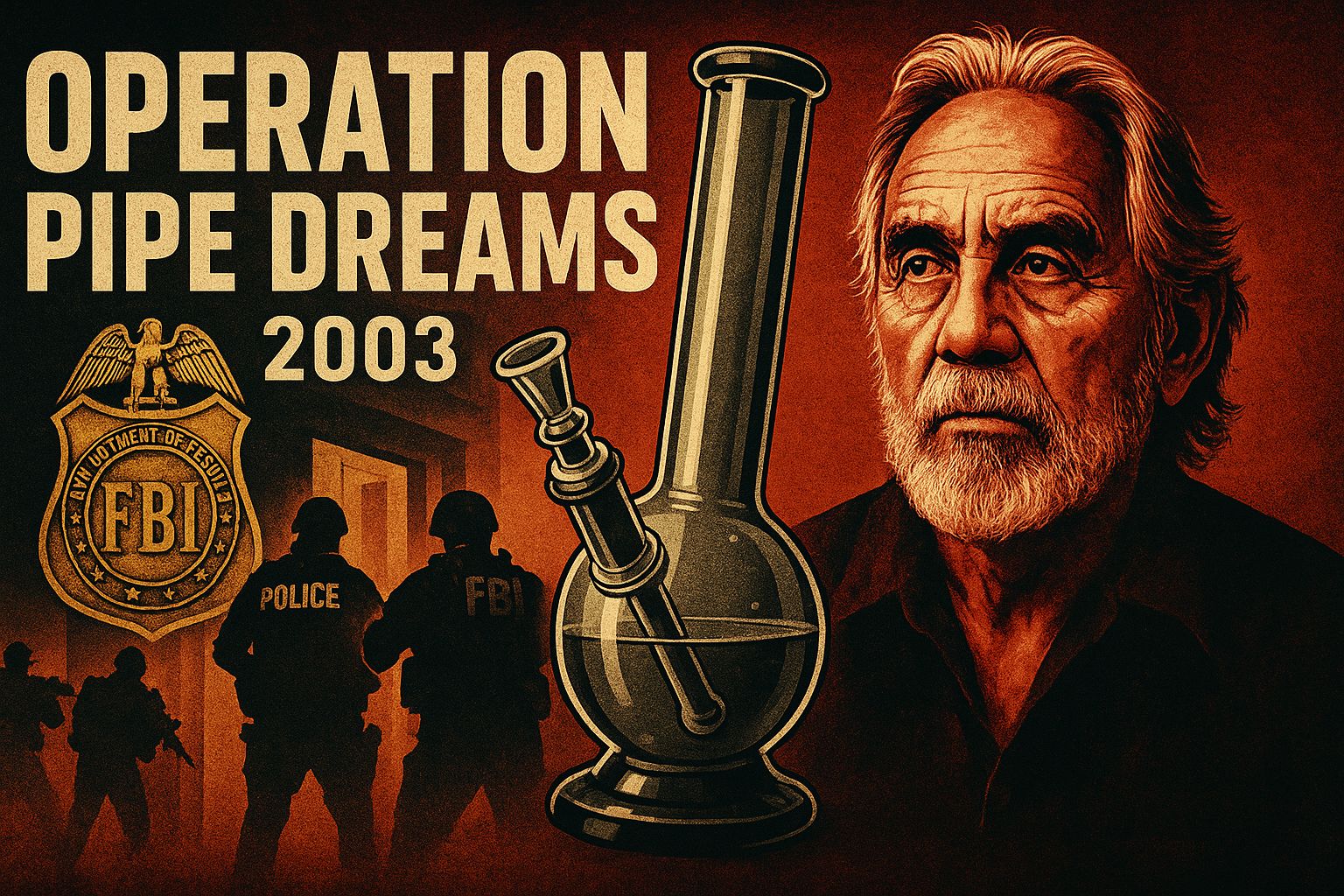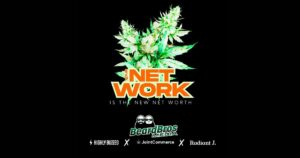In a country where you can now buy bongs at gas stations and head shops sit next to Starbucks, it’s wild to think that just a couple decades ago, you could end up in federal prison for selling glass. But that’s exactly what happened to Tommy Chong in 2003 thanks to the now-infamous Operation Pipe Dreams—a multi-million-dollar federal sting that sounds more like a Cheech and Chong skit than a real-life chapter in the U.S. war on drugs. Sadly, it was all too real.
Here’s the story of a comedy legend, a glass-blowing pioneer, and a questionable moment in modern drug policy enforcement. It’s an important tale that still resonates today.
What Was Operation Pipe Dreams?
In February 2003, under the Bush administration and led by then-Attorney General John Ashcroft, the U.S. Department of Justice announced a sting operation dubbed Operation Pipe Dreams. The mission? To target companies and individuals selling “drug paraphernalia”—aka glass pipes, water pipes, and other devices the feds deemed as being “intended for illegal drug use.”
It was part of the larger (and equally ridiculous) failed war on drugs, where cannabis, despite being used medically in some states at the time, was still federally illegal, and anything associated with it was fair game. And that included the glass used to smoke it.
The operation spanned 10 states and cost over $12 million of taxpayer money. That’s right—$12 million, to go after BONGS!!!! Federal agents executed over 60 raids and indicted 55 individuals and companies—most paid fines or served probation. But one person—the biggest name on the list—got the harshest sentence: Tommy Chong.
The Celebrity Fall Guy
By 2003, Tommy Chong was already a cannabis culture icon. Alongside his comedy partner Cheech Marin, he had built a career making movies and stand-up sets that didn’t just normalize weed—they celebrated it. Up in Smoke didn’t just entertain; it defined a generation of stoners. And that made him a target.
Chong’s son, Paris Chong, operated a company called Nice Dreams Enterprises, a clever nod to one of Tommy’s films. The company sold glass bongs and pipes online, including some that featured Tommy’s likeness. Undercover agents, posing as headshop owners from Pennsylvania (where paraphernalia laws were particularly strict), repeatedly ordered pipes from Nice Dreams—even after being told the company didn’t ship to that state.
Eventually, under pressure and likely not realizing the trap, the company shipped to the agents—and boom, the feds moved in. Tommy Chong was charged not for selling weed or running a dispensary, but for conspiracy to distribute drug paraphernalia.
Although he was a first-time offender and wasn’t directly running the day-to-day operations of the business, the court sentenced Tommy Chong to nine months in federal prison, fined him $20,000, and required him to forfeit $103,000 in cash and merchandise. He began serving his sentence on October 8, 2003, at the Taft Correctional Institution in California.
The message was clear: the government wanted to make an example out of him. As Assistant U.S. Attorney Mary Beth Buchanan proudly stated at the time, Chong’s punishment was influenced by his “movies that trivialize law enforcement efforts to combat drug use.”
Another Victim of the Paraphernalia Witch Hunt – Jerome Baker
Another big name caught up in this witch hunt was Jason Harris, founder of Jerome Baker Designs (JBD). A pioneer in the glassblowing world, Harris had turned his company into one of the most respected in the cannabis glass space. His custom bongs were considered functional art—bold, colorful, and culturally iconic.
But during the sweep, Harris was also hit hard. He faced prosecution, was placed under house arrest, and had many of his glass pieces seized by the federal government. Some were even destroyed, despite their artistic and cultural value. It was a massive blow to his business and a reminder of how far the government was willing to go to criminalize cannabis culture.
Fortunately, Harris rebounded. He rebuilt JBD into the powerhouse it is today, designing pieces for celebrities and even creating the world’s largest bong—a 24-foot-tall monument to how far we’ve come and how ridiculous those earlier crackdowns really were.
Glass is Everywhere Now – How Ironic
Fast forward to 2025. Not only is cannabis legal for adult use in 24 states and medically available in many more, but bongs, dab rigs, vape pens, and every form of consumption accessory you can imagine are sold in mainstream retailers, displayed proudly on Instagram, and marketed with influencer campaigns.
You can walk into a store in all 50 states and buy the same type of water pipe that put Tommy Chong behind bars. You can get a credit card processing system and a retail license to sell that glass. Brands like Jerome Baker are celebrated in pop culture and museum exhibits. Even the World of Cannabis Museum now highlights Operation Pipe Dreams as a cautionary tale of unjust enforcement.
It’s a slap in the face to the people who served time, lost businesses, or had their reputations ruined for selling things society now considers completely normal. It shows the absurdity and hypocrisy of selective enforcement, especially when you realize that none of this was ever really about public health or safety. It was about optics. About punishing cannabis culture. About sending a message.
Selective Justice and Cannabis Criminalization
Tommy Chong did real time in federal prison for selling GLASS. Meanwhile, tens of thousands of people—disproportionately Black and Brown—still carry criminal records for cannabis offenses that wouldn’t even get a citation in legal states today.
That’s not just ironic. It’s unjust.
Operation Pipe Dreams may feel like ancient history nowadays, but its echoes are still here. Cannabis is big business now, worth billions annually, but the people who laid the cultural groundwork—the activists, artists, entrepreneurs, and yes, even comedians like Tommy Chong—paid a steep price.
It’s time we stop treating cannabis like a crime and start treating it like the legitimate, beneficial plant that it is. And it’s time we make amends.
Expunge the records. Free the prisoners. Acknowledge the pioneers. And never forget that the government once spent millions of dollars and years of effort… to bust a guy for bongs.
From Pipe Dreams to Policy Change
At Beard Bros Pharms, we don’t just talk cannabis—we live it. And stories like Operation Pipe Dreams fire us up because they remind us why advocacy is still essential. The war on drugs might be fading, but the damage it left behind is still fresh.
Authorities criminalized Tommy Chong, Jason Harris, and countless others for being ahead of their time. Now that the rest of the world is catching up, we owe it to them—and to all those still impacted—to rewrite the story. That means pushing for full federal legalization, criminal justice reform, and a cultural shift that honors the roots of the cannabis movement instead of erasing them.
Because no one—celebrity or not—should ever do time for glass.
Want to read more cannabis history and culture? Check out our other stories at Beard Bros Pharms!






















